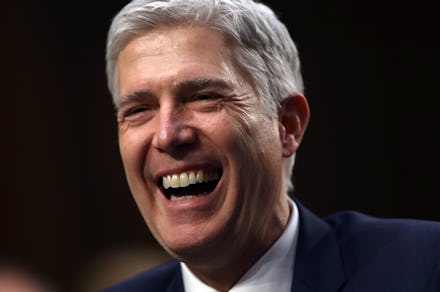Neil Gorsuch confirmed to the Supreme Court

Neil Gorsuch was confirmed to a lifetime appointment to the Supreme Court on Friday, wrapping up a contentious 14-month battle that fundamentally altered how future justices will be seated on the nation's highest court.
The Senate confirmed Gorsuch with a 54-45 vote.
Gorsuch's confirmation comes a day after Republicans changed the rules on the threshold Supreme Court justices must meet to win confirmation.
Previously, Supreme Court nominees needed 60 votes to proceed to the Senate floor for a full vote. The threshold ensured justices had support from a bipartisan coalition of senators, as it's rare for a political party to have a 60-40 majority in the Senate. Republicans, however, changed the rules on Thursday, requiring nominees earn only a simple majority to advance.
Given the United States is governed by a two-party system, with one party holding a majority at any given time, the change in rules means nominees won't have to win bipartisan consensus to be confirmed to the Supreme Court. Experts say this could lead to a more partisan court in the future.
Gorsuch will fill the vacancy left by Justice Antonin Scalia's death in February 2016. Former President Barack Obama had nominated Judge Merrick Garland to fill Scalia's spot, but Republicans — who held the majority in the Senate — refused to give Garland a hearing or a vote, insisting the decision should wait until the American people elected a new president. In other words, they hoped a Republican would win the White House and preferred a Republican president nominate Scalia's successor.
Their wish came true. President Donald Trump nominated Gorsuch — a federal judge from Colorado's 10th Circuit Court of Appeals who is considered an "originalist" — to fill the seat. Gorsuch's judicial orthodoxy is similar to Scalia's.
While the court's political leaning is expected to look the same as it did when Scalia served, the court's partisan breakdown could change if liberal justices such as Ruth Bader Ginsburg or Steven Breyer — who are 84 and 78, respectively — retire or die during Trump's presidency.
If Trump successfully nominates conservative justices to fill their roles, the court's ideological makeup will be altered, possibly for decades.